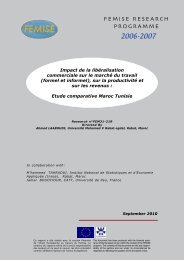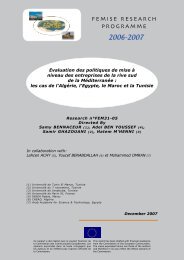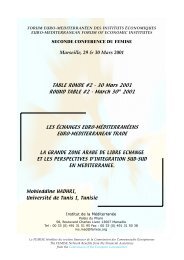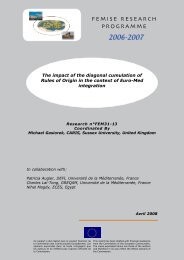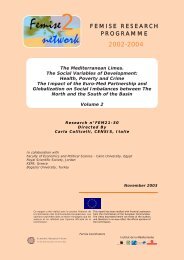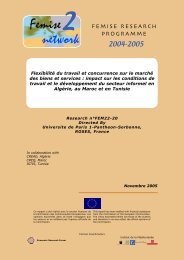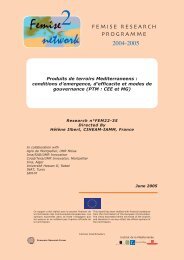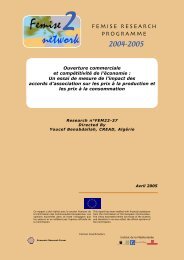- Page 1 and 2: F E M I S E R E S E A R C H P R O G
- Page 3 and 4: What Can Be Learnt from the New Eco
- Page 5 and 6: AMGA: American Medical Group Associ
- Page 7 and 8: USA: United State of America WB: Wo
- Page 9 and 10: medical doctors are then free to en
- Page 11 and 12: elate to quality research and educa
- Page 13 and 14: This may concern also EU countries
- Page 15 and 16: discussed both in theory and practi
- Page 17 and 18: EU are then described and discussed
- Page 19 and 20: specialties. This study shows that
- Page 21 and 22: with this trade. Special arrangemen
- Page 23 and 24: into the developed countries; where
- Page 25 and 26: them as follow: Cross-border delive
- Page 27 and 28: In this regard, the EU is suggestin
- Page 29 and 30: Given the importance of health care
- Page 31 and 32: Serbia. Low wages, poor working con
- Page 33 and 34: • How does tertiary education wit
- Page 35 and 36: Driouchi & Kadiri (2010) are promis
- Page 37 and 38: annual living costs per student. Th
- Page 39 and 40: Lithuania 4.12 4.15 4.01 4.03 3.97
- Page 41 and 42: Egypt 67.57 68.86 70.17 71.52 72.89
- Page 43 and 44: observed externally from developing
- Page 45 and 46: Relative Wages : MIN MENA / By comp
- Page 47: No future, Heavy workload, to save
- Page 51 and 52: Other European Countries Austria 4
- Page 53 and 54: one medical university and studies
- Page 55 and 56: includes a three-year vocational tr
- Page 57 and 58: has 18 medical universities and stu
- Page 59 and 60: général du Gouvernement to gradua
- Page 61 and 62: of Medical Science, Bachelor of Med
- Page 63 and 64: Egypt Iran 29463 31445 32134 25990
- Page 65 and 66: major policies and strategies relat
- Page 67 and 68: The aim of this sub-part is to prov
- Page 69 and 70: • What is the role of mobility of
- Page 71 and 72: Commonwealth of Independent states
- Page 73 and 74: Dodani and LaPorte (2005) suggest t
- Page 75 and 76: In regards to the mobility of Europ
- Page 77 and 78: The general conclusions of these th
- Page 79 and 80: Specific factors Impact of HIV/AIDS
- Page 81 and 82: Portugal X X Romania X X X Russian
- Page 83 and 84: Germany Italy Spain Lithuania Slova
- Page 85 and 86: Italy (2%) and Russia (4) in 2008 (
- Page 87 and 88: theory assumes perfect transferabil
- Page 89 and 90: The data available suggest potentia
- Page 91 and 92: This chapter deals with the migrati
- Page 93 and 94: networks and on the major channels
- Page 95 and 96: assumed here that emigration decisi
- Page 97 and 98: Increases (respectively decreases)
- Page 99 and 100:
Figure II.1.2: The shape of H as a
- Page 101 and 102:
The optimal emigration rate that ca
- Page 103 and 104:
Figure II.1.4: Effects of the Level
- Page 105 and 106:
empirical investigation focuses on
- Page 107 and 108:
Table II.1.3.1: Country annual tren
- Page 109 and 110:
Table II.1.3.2: Country annual tren
- Page 111 and 112:
! ! C/D>)! 01::! 0103! 5881::7! E#%
- Page 113 and 114:
"#$%&'!()*)+!Eurostat Database Abou
- Page 115 and 116:
Using these parameter estimates, co
- Page 117 and 118:
different websites for different co
- Page 119 and 120:
the theoretical values of the relat
- Page 121 and 122:
p-value 0.33 0.03 t test 0.99 2.25
- Page 123 and 124:
The following set of graphs are the
- Page 125 and 126:
The countries with higher number of
- Page 127 and 128:
Turkey (m*=0.41, m**=0.77) Yemen (m
- Page 129 and 130:
periods but should be concerned abo
- Page 131 and 132:
health report “Comptes Nationaux
- Page 133 and 134:
In accordance with the health insur
- Page 135 and 136:
95 adults >15 years old per 100000
- Page 137 and 138:
To achieve progress in the health s
- Page 139 and 140:
The external problems comprise (1)
- Page 141 and 142:
first four hospital universities ex
- Page 143 and 144:
monitoring trends and economic fact
- Page 145 and 146:
Other support staff 6300 2.11 2004
- Page 147 and 148:
areas, the case of doctors who reti
- Page 149 and 150:
areas of Morocco. It is computed ye
- Page 151 and 152:
political instability, economic dep
- Page 153 and 154:
1. Gender VS Intention to Migrate A
- Page 155 and 156:
salaries differs according to the w
- Page 157 and 158:
Results The results are given below
- Page 159 and 160:
These results suggest that the numb
- Page 161 and 162:
Finally, the questionnaire records
- Page 163 and 164:
The past decades have witnessed an
- Page 165 and 166:
changed the notion of space, where
- Page 167 and 168:
implications on health, Huynen et a
- Page 169 and 170:
Figure III.1.3: Social stratificati
- Page 171 and 172:
Lee et al., (2007) primarily focus
- Page 173 and 174:
However, Collins (203) does recogni
- Page 175 and 176:
America. In Africa, where there are
- Page 177 and 178:
physicians from Liberia practice in
- Page 179 and 180:
Figure III.1.7: Migrant care worker
- Page 181 and 182:
espectively. An interesting particu
- Page 183 and 184:
Table III.1.5: Supply of foreign (-
- Page 185 and 186:
Table III.1.6: Health care wages in
- Page 187 and 188:
Figure II.1.11: Factors affecting h
- Page 189 and 190:
Figure III.1.12: Factors contributi
- Page 191 and 192:
Table III.1.10: International Quali
- Page 193 and 194:
health as integral to wellbeing thr
- Page 195 and 196:
III.2.1 Need for A cooperative Fram
- Page 197 and 198:
graduate spends of certain number o
- Page 199 and 200:
III.2.2 Migration of Medical Doctor
- Page 201 and 202:
The convexity condition is simply a
- Page 203 and 204:
• A payoff vector (ai)i S is said
- Page 205 and 206:
III.2.2.2 Discussion and Public Pol
- Page 207 and 208:
Europe. Second, in the North Africa
- Page 209 and 210:
In the short run, the country of or
- Page 211 and 212:
great incentive for medical student
- Page 213 and 214:
system, and therefore to the rest o
- Page 215 and 216:
MENA countries could be moving to p
- Page 217 and 218:
of their medical school. The other
- Page 219 and 220:
Beine, M., Docquier, F. & Rapoport,
- Page 221 and 222:
German Medical Association.(2011).
- Page 223 and 224:
World Bank Database, 2007. World Ba
- Page 225 and 226:
http://gse.buffalo.edu/org/inthighe
- Page 227 and 228:
Berland, Y. (2002). Demographie des
- Page 229 and 230:
Gericke, C.A. (2006). Finance healt
- Page 231 and 232:
Salehi-Isfahani, D., Tunali, I., As
- Page 233 and 234:
Beine, M., Docquier, F. & Rapoport,
- Page 235 and 236:
Docquier, F., Lohest, O. & Marfouk,
- Page 237 and 238:
Labdelaoui, H. (2010). Les dimensio
- Page 239 and 240:
Stark, O. (1991), The Migration of
- Page 241 and 242:
WHO - World Health Organization (20
- Page 243 and 244:
Linacre, S. (2007). “Migration: p
- Page 245 and 246:
Challenging Inequities in Health: F
- Page 247 and 248:
Mullan, F. (2007). Doctors and Socc
- Page 249 and 250:
Vujicic M, Zurn P, Diallo K, Dal Po
- Page 251 and 252:
Collins, T. (2003). Globalization,
- Page 253 and 254:
Kana, M.A., (2009). From Brain Drai
- Page 255 and 256:
Sagoe, K. (2004). Using the Diaspor
- Page 257 and 258:
Sub-part II.1: Appendix I Appendice
- Page 259 and 260:
means that So if , then: > which is
- Page 261 and 262:
A, B,C>0 and , , Then Demo 5: Sign
- Page 263 and 264:
t test 3.21788138 1.86856175 3.1713
- Page 265 and 266:
Lithuania Years m Relative wage H/H
- Page 267 and 268:
Romania Years m Relative wage H/H0
- Page 269 and 270:
MENA Countries Risk Neutral Model C
- Page 271 and 272:
Tunisia Turkey 1993 0.1781 2.50 1.9
- Page 273 and 274:
Syria Tunisia Turkey Yemen Stand.de
- Page 275 and 276:
Morocco Syria Tunisia t-stat (theor
- Page 277 and 278:
Risk aversion model summary table C
- Page 279 and 280:
Table II-2-1.2: Projections of the
- Page 281 and 282:
Observations 5 Coefficients Erreur-
- Page 283 and 284:
Figure 4: Age distribution within r
- Page 285 and 286:
Figure 11: Migration conditions dis
- Page 287 and 288:
! "(&!
- Page 289 and 290:
! "((!
- Page 291 and 292:
! ")+!
- Page 293 and 294:
! ")"!
- Page 295 and 296:
! ")$!
- Page 297:
! ")&!



